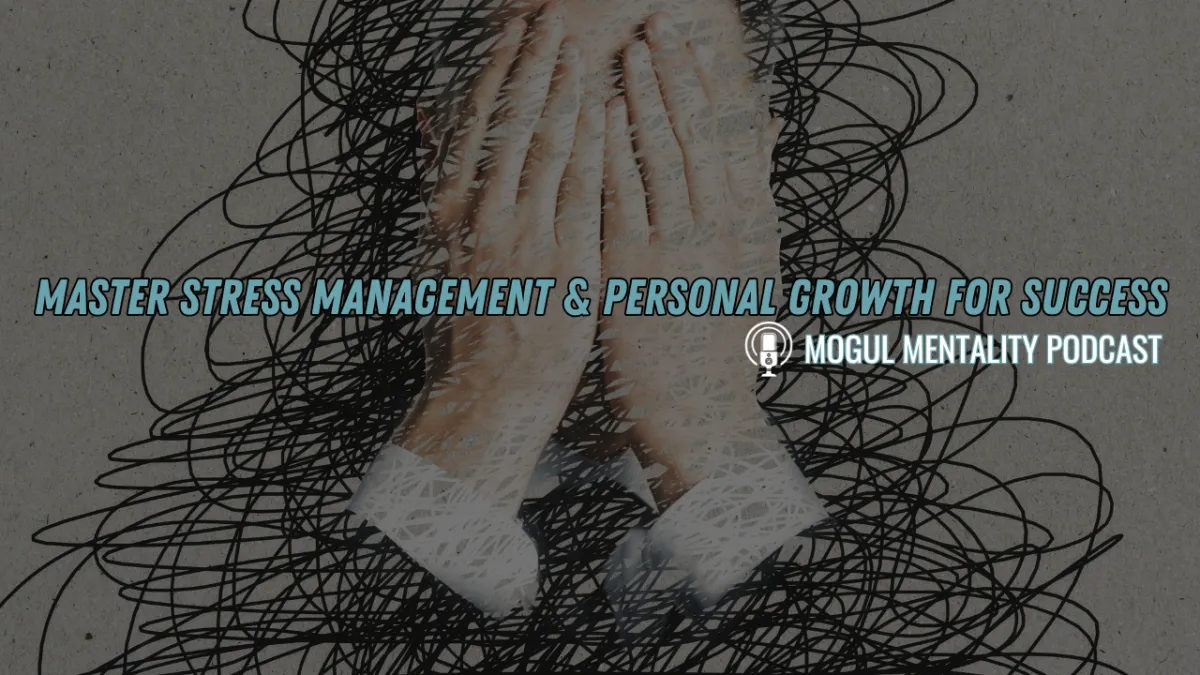
Mastering Workplace Stress Management: Your Guide to Happiness
Mastering Workplace Stress Management: Your Guide to Happiness
Welcome to our guide to workplace stress management! In today's fast-paced work environment, stress is unfortunately an all-too-common occurrence. We understand that managing stress at work can be challenging, but it doesn't have to be overwhelming. With the right mindset and effective stress management techniques, you can create a healthier and happier work-life balance.
Unlock Your Potential: Mastering Stress for Personal Growth and Success! 🚀 Discover Proven Strategies in My Latest YouTube Video!
In this section, we will explore the importance of workplace stress management and provide you with practical tips and strategies that you can start using today. No matter if you're an employee or a manager, we're confident that you'll find something useful in this guide.
Key Takeaways
Stress management in the workplace is normal.
Effective stress management techniques can help create a healthier work-life balance
These techniques can be applied regardless of your position
There are stress management activities and stress management programs available
Overall well-being can be promoted through stress management- healthy eating to prevent burnout.
Understanding Workplace Stress and Its Impact
When it comes to workplace stress management, it's essential to first understand what workplace stress is and how it can affect us. Workplace stress refers to the emotional and physical strain that can result from demanding or challenging job responsibilities and work environments.

While some levels of stress can be beneficial, excessive or chronic workplace stress can be detrimental to our health, well-being, and job performance.
The Impact of Workplace Stress
When stress levels become too high, it can lead to burnout, a state of emotional, physical, and mental exhaustion. Burnout symptoms may include- to prevent burnout.
Feeling emotionally drained and depleted
Lacking motivation and feeling cynical about work
Reduced productivity and effectiveness
Difficulty concentrating and remembering details
Physical symptoms such as headaches, back pain, and insomnia
Increased susceptibility to illness
When we experience burnout, it can have a significant impact on our job satisfaction, career growth, and overall quality of life both in and out of work.
Recognizing Workplace Stress and Burnout
It's essential to recognize when we or our colleagues may be experiencing excessive stress levels or burnout. Some common signs of workplace stress may include:

Feeling anxious, irritable, or depressed
Having trouble sleeping or staying focused
Feeling overwhelmed or unable to meet work demands
Experiencing physical symptoms such as headaches or stomach issues
The loss of enjoyment in work or hobbies
If you or someone you work with is showing signs of burnout, it's crucial to take action to address the underlying causes and prevent further damage.
Effective Stress Management Techniques for the Workplace
At times, work can be stressful and overwhelming; however, we can adopt stress management techniques that can make our work more manageable. Here are some stress management strategies that can help you maintain a healthier work-life balance:
Time Management Techniques
Time management techniques can help you prioritize your tasks and avoid feeling overwhelmed. Effective time management involves scheduling your tasks, breaking down your work into smaller tasks, and setting realistic deadlines.

Relaxation Exercises
Engaging in relaxation exercises can also be helpful in coping with workplace stress. You can incorporate breathing exercises, stretching, and meditation into your daily routine to help you relax.
Mindfulness Practices
Mindfulness practices, such as being present in the moment and focusing on your breath, can help you manage stress and anxiety. You can take a few minutes each day to practice mindfulness and improve your ability to concentrate on your work tasks.

Workplace Stress Relief Activities
Participating in workplace stress relief activities can be a great way to reduce stress levels. You can organize a walking or exercise group for your colleagues, take breaks to stretch and relax, or even participate in a company-sponsored stress management program.
Stress Management Tips
Here are some additional stress management tips that can help you maintain a healthier work-life balance:
Set realistic expectations for yourself
Take regular breaks throughout the day
Stay organized and prioritize tasks
Communicate with your colleagues and managers
Avoid overworking and saying "yes" to everything
By incorporating these stress management techniques and tips into your work routine, you can create a healthier and more productive work environment. Remember to take care of yourself and prioritize your well-being!

Nurturing a Healthy Lifestyle to Prevent Burnout
To prevent burnout, it's essential to nurture a healthy lifestyle. We need to take care of ourselves mentally and physically to maintain a productive work-life balance. Incorporating healthy eating habits into our daily routine is an excellent place to start.
Healthy Eating to Prevent Burnout:
A healthy diet can help boost energy levels, improve focus, and reduce stress. To maintain a healthy diet, we should limit processed foods and aim to include plenty of fruits, vegetables, lean proteins, and whole grains. By eating a balanced diet, we can fuel our bodies with the necessary nutrients to support a healthy lifestyle.
Exercise for Burnout Recovery:
Regular exercise can significantly aid in burnout recovery by reducing stress levels and boosting mood. Engaging in physical activities, such as a brisk walk, yoga, or strength training, can help release endorphins, which can help alleviate symptoms of anxiety and depression.

Self-Care for Preventing Burnout:
Incorporating self-care into our daily routine is essential for preventing burnout. Taking time for ourselves, whether it's through meditation, a relaxing bath, or a massage, can help reduce stress levels, improve mood, and increase productivity.
Work-Life Balance:
To prevent burnout, it's crucial to create a healthy work-life balance. We should set boundaries by limiting overtime and taking time off when necessary. By prioritizing our mental and physical well-being, we can maintain long-term productivity and prevent burnout.
By nurturing a healthy lifestyle, we can create a solid foundation for long-term workplace stress management. Adopting healthy eating habits, engaging in regular exercise, practicing self-care, and maintaining a healthy work-life balance are all effective strategies for preventing burnout and promoting overall well-being.
Ready to transform your work life and conquer stress? Click the link now to discover practical strategies that will help you reduce stress and thrive in your professional journey! Your improved work-life balance starts here. 👩💼🌟
FAQ
What is workplace stress management?
Workplace stress management refers to the strategies and techniques used to effectively cope with and reduce stress in a work environment. It involves implementing practices that promote a healthier and happier work-life balance.
Why is workplace stress management important?
Workplace stress management is important because excessive stress can negatively impact both individuals and organizations. By effectively managing stress, individuals can improve their overall well-being, productivity, and job satisfaction, while organizations can benefit from reduced absenteeism, turnover, and healthcare costs.
What are some effective stress management techniques for the workplace?
There are several effective stress management techniques for the workplace, including time management strategies, relaxation exercises, mindfulness practices, and regular breaks throughout the day. These techniques can help individuals better manage their workload, reduce stress levels, and improve focus and productivity.
How can a healthy lifestyle prevent burnout?
Maintaining a healthy lifestyle is crucial in preventing burnout. Healthy eating habits, regular exercise, self-care practices, and achieving a proper work-life balance can all contribute to preventing burnout. These habits support overall well-being and help individuals better manage stress levels, promoting a healthier and more sustainable approach to work.
